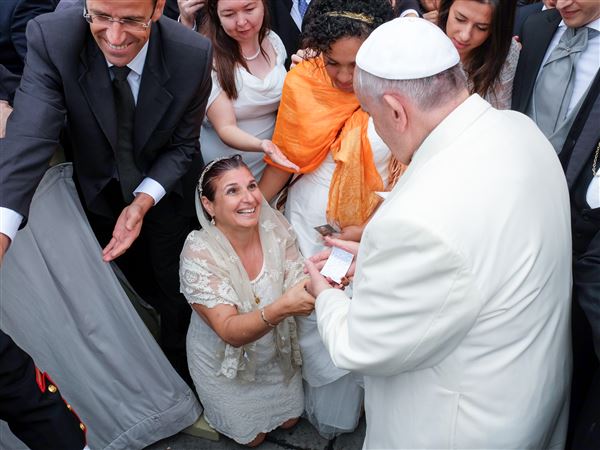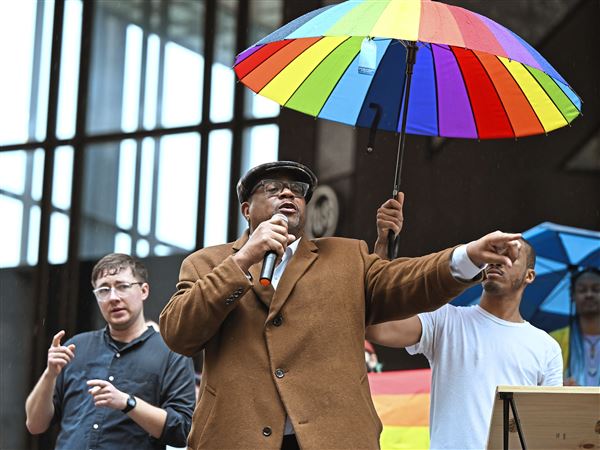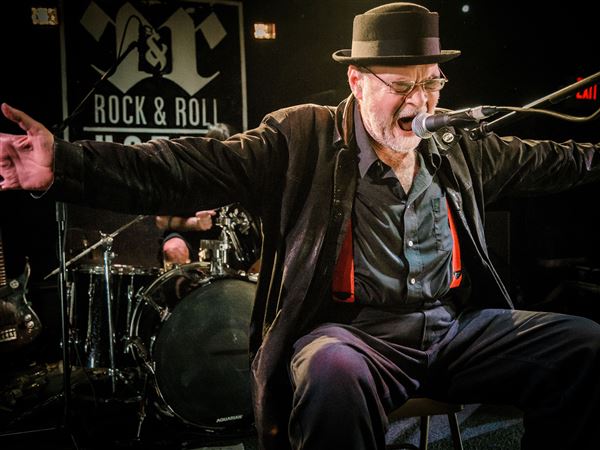A proud old man died the other day and a window on history closed.
Jerzy Einhorn was 92 when he passed away at his Mt. Lebanon home on July 4.
A prominent doctor in his native Poland in the 1960s, he came to the U.S. in 1967 and became an endocrinologist at Montefiore Hospital, where he treated thousands of patients and directed the thyroid screening program. He also established health clinics in Hazelwood and Greenfield and taught at the University of Pittsburgh.
Dr. Einhorn leaves behind a wife and three children from two marriages. He also leaves behind a back story from his youth straight from the movies -- a tale full of Nazis, narrow escapes and dangerous liaisons in occupied Poland during World War II.
A Polish cavalry officer, he fought the Germans in 1939 and then served with the Polish underground Home Army in the Warsaw Uprising, a battle that ended with the Nazi annihilation of the city in 1944.
He won military decorations, escaped captivity multiple times, twice crossed the Eastern Front, swam the Vistula River and ended up imprisoned and beaten by the Soviet secret police in 1945.
He lost his father -- forced to dig his own grave before being shot -- and a sister, sent to a concentration camp with her two children.
His story is one of millions from that time, but unlike many others, he wrote it all down in a memoir, "Recollections of the End of an Era," published in Polish in 2000 and translated into English in 2005.
The book sold fairly well, but he wrote it mostly for his children so they would understand his early life. Although a caring father, he was feisty and tough, they said, and no doubt hardened by the war.
"He never called himself a hero. He was thrown into a situation and did the best he could, like everyone else," said his son Janusz, who lives in the West End. "He had a really strong character. He was the kind of guy who had to be in charge."

Jerzy Einhorn was born into a Jewish family in the coal town of Sosnowiec in 1919. After his parents divorced when he was a child, he converted to Catholicism, although he never had much use for formal religion.
His much-older sisters, Halina and Terenia, did not convert. Halina would survive while Terenia perished in the Holocaust.
Jerzy attended a military academy and then college, hoping to become an engineer. But the war came and he was called for duty with the horse-drawn artillery. Before he left for battle, Terenia slipped her sapphire ring onto his finger, saying, "Wear it. It will protect you."
In the September 1939 campaign against Hitler's panzer blitz, he writes in his memoir, he had to threaten his own men with a machine gun to keep them from running away. "Whoever abandons his gun will be shot!" he told them.
Four Messerschmitt fighters strafed his position. "After the first air raid, I was surprised to be still alive, thus I set the heavy machine gun to fire upwards," he writes. He drew a bead on the fourth plane and opened fire. He didn't realize he'd hit it until an officer yelled that the black smoke rising from a nearby forest was where the plane had crashed.
He and his unit were awarded the Virtuti Militari, Poland's highest military honor. But their efforts were in vain. The Polish army was soon overwhelmed and surrendered.
Next came the first of several incidents in which the enemy showed compassion amid brutality.
On his way to a prison camp, a German soldier demanded that he give up his flashlight. He refused, and the man angrily drew his revolver. "For the moment I feared that since I had not been killed during the campaign," Jerzy writes, "I might now be killed on the way to prison camp."
But a German officer said kindly to him, "Don't be a fool. Don't risk your life for a mere torch." Jerzy gave up the flashlight and "wondered whether it had been luck or my first encounter with a human being in a hostile world."
Polish soldiers were sent home, but the officers detained. An officer's duty was to escape, so Jerzy handed his officer's topcoat to the nearest private and put on the man's coat, then joined the ranks and walked into Warsaw a free man.
He was soon recaptured. But when he and other prisoners stopped for a drink, a guard turned away and Jerzy slipped into some thorn bushes, escaping again.
He walked to a cottage in the woods, where a family gave him food. Two Germans approached on bikes and asked if he'd seen any escaping Polish soldiers. He said no.
The Germans noticed a rabbit hutch and began discussing rabbits. Jerzy heard one of them say "angora," so when they asked him the breed of rabbit, he told them "angora," although he knew nothing about rabbits.
The first soldier told his mate, "See, I told you they were angoras." When they asked for the rabbits' names, Jerzy said "Uciekinier and Uciekinierka," Polish for "Mr. and Mrs. Refugee." One of the Germans remarked that Polish names are hard to pronounce, and they mounted their bikes and left.
It was one of many lucky episodes for Jerzy.
Jerzy soon moved in with a girlfriend's family in Warsaw, where the occupation had begun and where all Jews were forced to wear the Star of David.
He took a job at a German-run factory that made tank shells and joined the Polish Home Army as an intelligence officer, training groups of young men in secret. The Gestapo was everywhere, but he had employment papers that allowed him to move freely throughout the city.
The Germans had by now closed off the Jewish ghetto. Jerzy, however, was able to get his aunt Helenka out simply by having her remove her Star of David. The two of them calmly walked through a gate to the Aryan side, where he had rented an apartment for her. But Helenka chose to return because she would not leave her family behind.
Jerzy writes that he was "dumbfounded" by her decision but could not change her mind. Many Jews made similar choices. In April 1941, Jerzy and other operatives were told to convince those Jews who were allowed to leave the ghetto for work that they had to escape because the Germans planned to kill them all.
"The Jews neither paid any attention to our warning nor believed in the fate of other ghettos in Poland," he writes. "They refused to believe the Warsaw ghetto could ever share the same fate."
Jerzy later tried to save his sister Terenia from the Jewish side of the city of Stanislawow, where she lived with her two children and another couple. He could get them out if they came to Warsaw one at a time.
Terenia refused. "Everyone or no one," she said.
"After supper Terenia embraced me," Jerzy writes, "dropped her head on my shoulder and wept for a long, long time."
He never saw her again. She and the children died in a concentration camp, probably Treblinka.
Returning to Warsaw, Jerzy organized watchdog groups to keep an eye on German maneuvers and met a girl named Jadwiga, whom he would later marry. She helped him carry secret documents, since a woman was less likely to be searched. Secrecy was especially important after 1943, when Jerzy heard the Gestapo was hunting him and changed his name to Kronowski.
A devastating blow came that year, when he learned that his father, Oskar, had been arrested by the Gestapo in Czestochowa. He had been taken to the Jewish cemetery, forced to dig a grave and executed. Oskar had been turned over to the Germans by an informer.
Such betrayals were not uncommon. The war in Poland brought to bear a full range of human behavior. There were brave resistance fighters and corrupt turncoats, good Germans and bad ones.
In one instance, Jerzy was forced to open his fly and show two police officers his penis. He had been circumcised as a Jew, but he told them it was for health reasons. They believed him but said a Gestapo man with them would require a bribe. Jadwiga gave up her jewelry. But soon one of the officers ran back to Jerzy and returned it. "Take it back," he said, "and give it to your fiancee."
Jerzy thanked the man, saying he would not forget the kindness.
On Aug. 1, 1944, the Warsaw Uprising began. As the Red Army advanced from the east, 38,000 Home Army members rose against the German Army. One of Jerzy's jobs was to cross the Eastern Front and deliver orders to Home Army units in Otwock, already in Soviet hands, to push into Warsaw. He managed to deliver the order, amazed that no one shot at him on either side of the front.
After reorganizing some ragtag units in the eastern suburbs, he decided to return to Warsaw on his own. With bridges blocked, he had to swim the Vistula River. His first attempt failed. He evaded Germans by dressing as a woman, then plunged into the icy Vistula again. This time he made it and joined the insurgency.
The Home Army fought for 63 days, but in the end had to give up.
"We were still sure the Soviet forces would finally reach Warsaw and repel the Germans," he writes. "But the Red Army did not come to the rescue of Warsaw."
Stalin had ordered his army to pause while the Germans obliterated the city. Jerzy watched as the survivors moved out: "A multitude of humanity, laden with bundles, thronged the streets with stony looks upon their faces that said something entirely new, something unknown, awaited everyone."
Jerzy was taken prisoner and loaded onto a train. But he escaped through a tiny window at the top of the rail car and jumped to freedom. He wandered in the woods at 2 a.m., knocking on doors. Finally, he came to a church and a pastor took him in.
The priest told him to go to Nieborow, home of the royal Prince Radziwill family, where Edmond Radziwill was a member of the Home Army. Jerzy showed up on the doorstep and declared that he was a partisan who had just jumped from a German prison train.
"God almighty!" said Edmond Radziwill's mother. "Half the house is in German hands!"
While the Radziwills lived in one half of the palace, the Germans were using the other half as their headquarters. Still, Jerzy stayed and befriended Princess Izabella Radziwill, who many years later came to the United States and visited the Einhorns in Mt. Lebanon.

Jerzy eventually returned to Warsaw, but there was another adventure in store for him. His new role with the Home Army was to attend a conference with the Soviet secret police regarding the security of Polish government delegates who wanted to come out of hiding.
Jerzy made contact with the Soviets, but he was denounced as a liar and accused of terrorist activity. He was held captive, beaten and interrogated for weeks. One of his children, Edward, said he had often seen the scar on his father's buttocks from one of the beatings.
But here, too, kindness surfaced. One Russian guard brought him bandages, saying, "Don't ever tell anyone; it's not allowed."
The beatings finally stopped when the Red Army took Berlin. Jerzy was shipped off to a camp, but the Russian captain issued a warning before he left. "You Poles are calling the present system a democracy," he said, then tapped his palm with a rubber club. "This is the cure for Polish democracy."
Jerzy spent two months in the camp and two more in another at Poznan, where he met a German prisoner who was one of the owners of the Siemens, Halske & Schuckert engineering firm.
"The war is over," he told Jerzy. "If it had lasted a little longer, we would have been sure to win. We had a weapon of devastating power under construction."
In August 1945, while Jerzy was held in another prison, word came of Hiroshima. "I realized then," he writes, "that what old Siemens had told me was not a product of his imagination."
On Sept. 30, 1945, Jerzy was finally released from prison.
"My mother and Dziunia [Jadwiga] were already standing on the other side of the gates," he writes. "We embraced. I was a free man."
On his finger, he still had the sapphire ring Terenia had given him six years before.
After the war, Jerzy Einhorn married Jadwiga and they had three children -- Janusz, Robert and Ewa. They later divorced.
Dr. Einhorn emigrated to New York in 1967 and married his second wife, Ruth, whom he had met in London while he was doing medical research.
The couple lived in New York and then moved to Beckley, W. Va., before coming to Pittsburgh, where Dr. Einhorn went to work at Montefiore Hospital. The couple have a son, Edward, in Brooklyn, N.Y.
Jadwiga came to America in 1969 with the children. They lived in New York and then also moved to Pittsburgh, where Janusz had been accepted to Carnegie Mellon University.
Jadwiga still lives in Oakland. Janusz lives in the West End and Ewa lives in Michigan.
Robert died in 2002. It was his wife, Beata, who took down Jerzy's story in longhand.
After the fall of communism in 1989, the Polish Ministry of Defense promoted Dr. Einhorn to the rank of major. In 2008 he was promoted to lieutenant colonel.
Last year, the Polish ambassador traveled to Pittsburgh to present him with the Officer's Cross of the Order of Polonia Restituta at a ceremony at the Pittsburgh Athletic Association. It is the highest honor bestowed by the Polish government.
A memorial service will be held for Dr. Einhorn at 2 p.m. on July 30 at St. Paul's Episcopal Church on Washington Road in Mt. Lebanon.
First Published: July 24, 2011, 8:00 a.m.

















